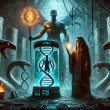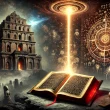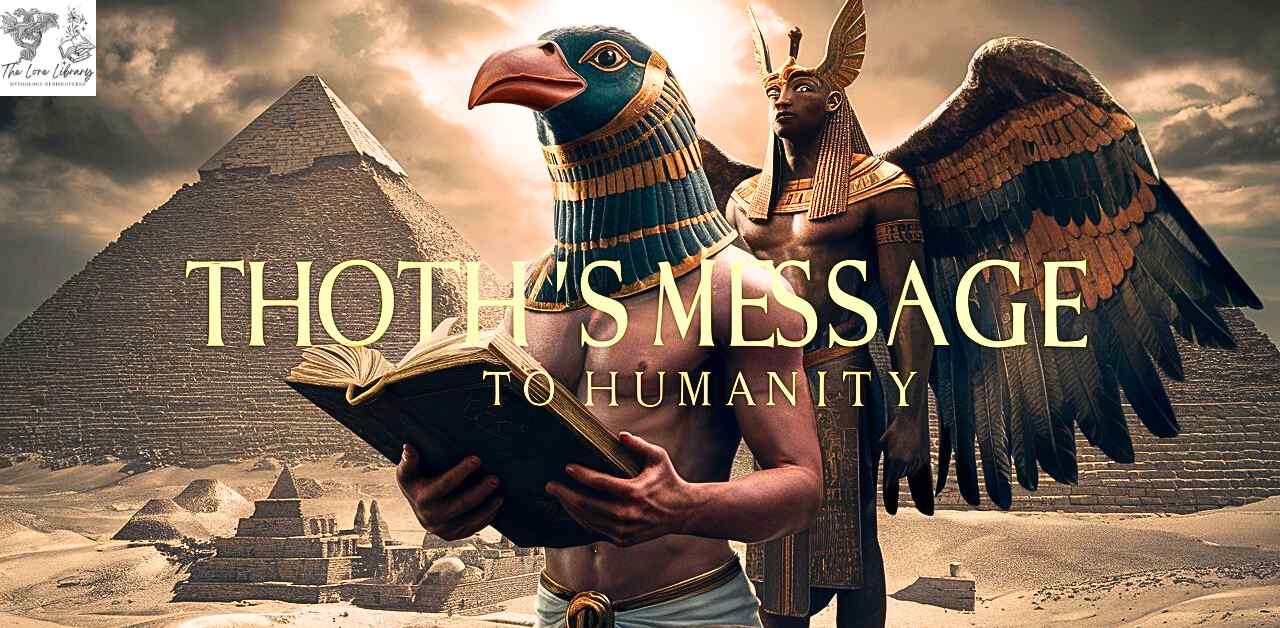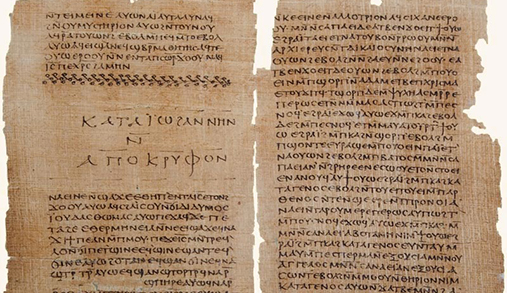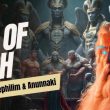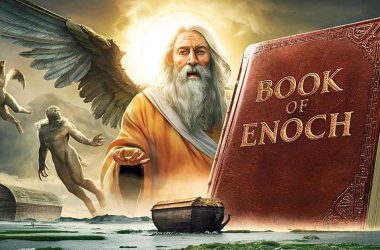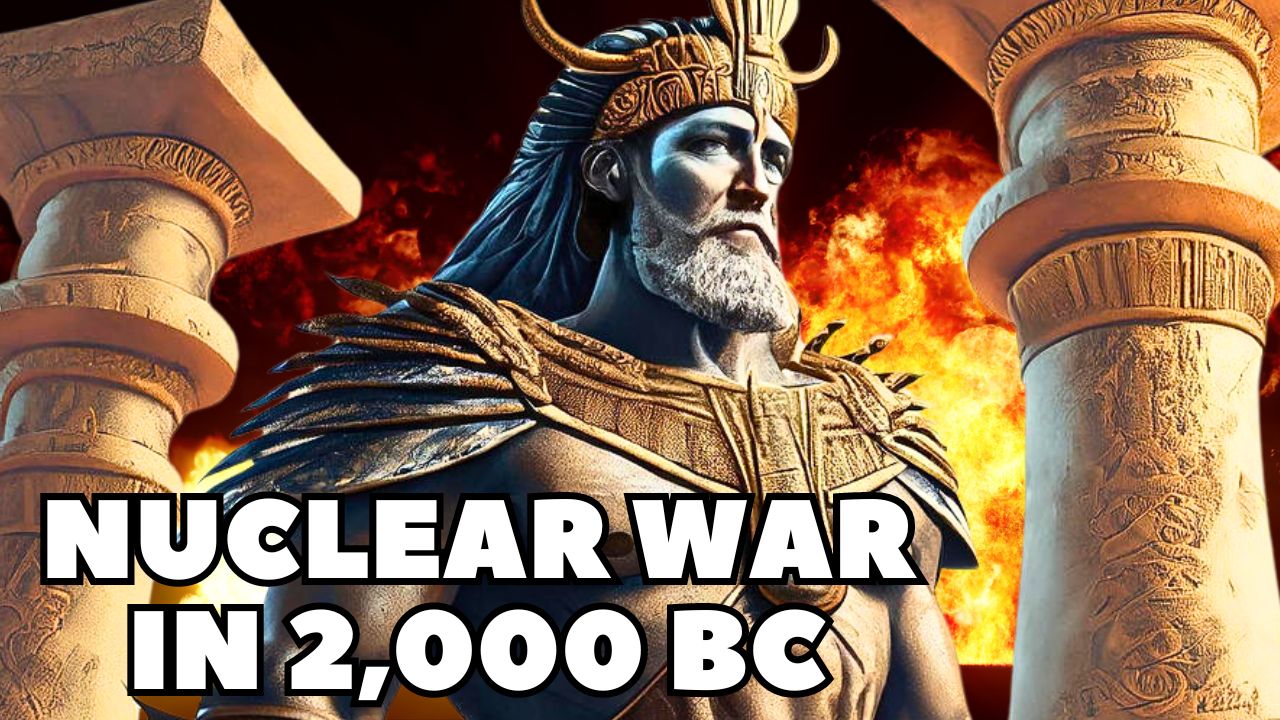“They will mingle with humans and drive them into all manner of recklessness and crime, into wars and theft with fords and all things hostile to the bodies and souls of human beings.” I believe that what Hermes foretold in this 2,000-year-old text, “Prophecy of Hermes”, we’re living through right now.
Do you know Asclepius, that Egypt is an image of the heavens, or to speak more exactly, in Egypt all the operations of the powers which rule and work in the heavens are present in the earth below? In fact, it should be said that the whole universe exists in this our land as in a sanctuary; and yet since it is fitting that wise men should have knowledge of all events before they come to pass, you must not be left in ignorance of what I will now tell you.

Prophecy of Hermes
There will come a time when it will have been in vain that Egyptians have aspired to the ways of higher beings in Hartford piety and service; all our holy worship will become powerless and pointless; the higher beings will return to the heavens; Egypt will be left and forgotten, and the land desolate would not one of the ancient deities remaining.
Oh Egypt, Egypt of my religion, nothing will remain but an empty tale, which in time even your own people will not Nothing will be left but words engraved on stone, and only the stones will speak of your piety, and in that day people will be tired of life and they will cease to think of the universe as something worthy of reverence and wonder.
People will no longer love the world around them, this incomparable work of the Creator, this glorious structure, this totality of good comprising so many diverse forms, this instrument through which the Creator operates in everything he has made, freely favoring human welfare, this combination and accumulation of all the manifold things that call forth the veneration, praise and love of the beholder; darkness will be preferred to light, and death will be thought more profitable than life; no one will raise their eyes to the heavens.
Good spiritual people, seekers of truth, will be considered insane; the vulgar and careless will be considered wise; the madman will be thought a strong man, and the wicked will be held up as good; as for the soul, and the belief that we are immortal beings, although we may hope to attain to immortality as I have taught you, people will consider it a joke, and even convinced themselves that it is false; no word of reverence or piety, no utterance worthy of heaven will be heard or believed, and so the higher beings will depart from mankind: a grievous thing!
Only those who bring evil messages will remain; they will mingle with humans and push them towards all kinds of recklessness, of crime, Into wars and theft and frauds and all things hostile to the bodies and souls of human beings; then will the earth tremble, and the sea burn, our ships heaven will not support the Stars in their orbits; all voices of the gods will be forced into silence; the fruits of the earth will rot; the soil will turn barren, and the very air was sickened with sun’s stagnation.
All things will be disordered and out of kilter, all good will disappear; but when all this has befallen, Asclepius, then the creator of all things will look on that which has come to pass, and will put an end to the disorder by the power of his will, and his will is everything Gordon; he will call back to the right path those who have strayed; he will cleanse the world of evil, washing it away with floods, burning it out with the fiercest fire and expelling it with war and pestilence.
And thus he will restore the world to its former beauty, so that the universe will once more be deemed worthy of wonder and reverence, and the source, the creator and maintainer of the mighty fabric of the universe, will be loved by the people of that time; their lives will resound with continuous songs of thankfulness and blessing; such is the new birth of the cosmos, our making again of all things good, a pure and inspiring restoration of all nature, all to unfold in the passage of time by the eternal will of the creator.
– Prophecy of Hermes
This prophetic statement from the dialog of Hermes with Asclepius speaks of a great forgetting, a great confusion and a final restoration. The character Hermes laments the forgetting of a culture, a civilization and all the advanced knowledge and human development that it held.
In its current form, the body of hermetic texts dates from the second to the third century of the Common Era, having been found in Latin and Greek translations, and the influences of Greek thought fill the pages of the hermetic documents; yet the text itself laments the loss of the wisdom of ancient Egypt.
Students of ancient narratives have long noted the association of the Greek figure of Hermes with the Egyptian figure of both in the Levant of Hermes to Asclepius; the focus on Egyptian knowledge suddenly came at a sharper focus when in 1945 the Nag Hammadi texts were discovered in Egypt, among them a copy of the hermetic texts written in Coptic, hinting at an ancient Egyptian source.
When I was a boy, my dad took me to visit Egypt, and when you stand in front of the ancient hieroglyphs and look at the writing that’s been etched into the walls, the sense of loss is profound.
What have we forgotten? Who are these deities depicted as human hybrids, and who were these people so much bigger than the regular human being, a sewer giving all their service and labor to them, and how is it that the knowledge of what is being portrayed in those texts and images became lost?
It’s also an open secret in Egypt that technology has been found, and it’s precisely engineered metal technology from what’s called pre-dynastic Egypt. So this vague name is given because we know next to nothing about this pre-dynastic civilization; we don’t know what their technology is or what it does.
Hermes lament foretold the time of that forgetting, and he talked about the time when these mute words carved into walls would be all that would remain of ancient Egypt’s knowledge of contact with higher beings and what all that meant.
The lament of Hermes proved to be prophetic; for centuries, the engraved words in the halls of ancient Egypt remained a closed book, unintelligible to a later civilization. But how does that happen? How is the advanced knowledge of an entire civilization extinguished?
In the year 30 BCE, the last Pharaoh died, and that was a great queen, Cleopatra; the Egyptian Empire had been subsumed into the Roman Empire, and so dynastic Egypt was at an end.
Four centuries later, in 381 ad, the Roman Emperor Theodosius, in an amazingly ambitious attempt to control the thinking of every subject in the Empire, passed a law to ban all pagan religion, and what that meant was that every ancestral memory, every ancient narrative, every indigenous mythology had to be extinguished; every priesthood, every esoteric sect had to be shut down, and so whatever remained of the Egyptian priesthood, and that was the body of people who knew how to decode the hieroglyphs and those glyphs carved into stone, was lost; the key to their translation went with them.
The forgetting was even worse than the lament of Hermes had predicted; without the translation key, even the in great stones could no longer speak their ancient messages until the 19th century of the Common Era, with the discovery of the Rosetta Stone, the stones of Egypt remained a closed mystery.
Cultural knowledge is often lost in times of invasion and colonization, and it’s often done quite deliberately; the power to control information, the power to control the media, the power to inform the people of what’s going on and how they must think has to reside with the colonizers, the conquerors.
If you think about Isis destroying every cultural site they take hold of, that would be an example, or if you think of the conquistadores when they arrived in South America in the 1400s, they deliberately extinguished all the ancient narratives; they burn the ancient texts and they executed the priesthoods that they found there, so there’s a very very deliberate extinguishing of previous knowledge, the knowledge of previous civilizations, and that is how ancient knowledge gets lost.
Under Greek rule, Egypt moved her capital from Memphis to Alexandria, and at the command of King Ptolemy, a museum was built, a world library to gather together every text and volume that would expand the consciousness and understanding of human society; then approximately 2,000 years ago, in the course of a Roman invasion, the entire museum was engulfed in a dramatic fire, it was a conflagration that took with it nearly 1 million Scrolls, the wisdom of Greek, Arabic and Pythagorean writers, writings from Assyria, India and other ancient sources; among its million volumes, the museum had contained the works of Eratosthenes, now he was a curator of the museum, his friends knew him as bata.
Bata was an amazing scholar, and he had written works that had calculated the circumference of planet Earth, he devised a system for mapping latitude and longitude which had never been done before, it calculated earth tilt on its axis as well as managed to work out our distance from the Sun; all his work, along with all the poetry in astronomy, geology, medicine, physics, engineering was destroyed.
And the Greek Roman historian Plutarch tells us how he reports how in 47 BCE Julius Caesar had arrived with Roman army and invaded, and it resulted in a fire that destroyed the building. Now bear in mind that the loss of this ancient body of knowledge meant that more than one and a half millennia later, after the time of beta had described all the properties of planet Earth in such amazing detail, there were people and cultures all around the world who believed the planet to be flat, and that is a dramatic example of how the knowledge of the Ancients can be lost.
Throughout history, invasion and conquest have often occasioned the destruction of ancestral and indigenous knowledge. Egypt suffered a succession of invasions and annexations by the Persians, the Greeks and then the Romans; as the monotheistic religions became anchored to the powers of empire in the east and west, so it was that indigenous narratives and wisdom traditions became suppressed.
The influence of writers like Socrates and Plato, important writers whose own understanding had plumbed the sources of ancient Egypt, was excised from the mainstream of Christianity; Church Fathers who had drawn on their wisdom found themselves sidelined and excommunicated; the romantic texts, though popular for a long time among early Christians, became regarded as subversive and dangerous; yet their influence continued to inform the thinking of mystics and scholars down the ages.
Writing in the fourth century BCE, the Greek philosopher Plato openly stated that while many of his conclusions were reached purely by applying logic to things we can all observe, he had reached other significant conclusions, things he believed but could not prove; the source of that information, Plato said, was ancestral memory, specifically the priestly knowledge of ancient Egypt.
Like Hermes in the dialogue with Asclepius, Plato was eager to keep what remained of ancient Egyptian wisdom alive; it’s in that context that Plato reports that he is concluded that there are other entities occupying our universe being similar to ourselves who reside on what he describes as islands in the sky.
He said that these beings live longer than we do, they’re more highly intelligent than we are, and their understanding of the universe and what we would call outer space is far more advanced than our own, and though we said he couldn’t prove it, Plato wanted to mark that knowledge on the wall; the notion of a more populated universe or of higher beings were ideas that Plato did not want to see forgotten.
In the 1500s, from Naples Italy, another student of the hermetic texts emerged in the Dominican friar Giordano Bruno. Bruno study of the hermetic texts led him to some far-reaching conclusions; as a Dominican friar, Giordano Bruno was a devoted scholar, and from his study of the hermetic texts, Bruno concluded, just as Plato had done 2,000 years before, that we are not alone in the universe, that there are other entities populating the cosmos and the other planets in our galaxy may be home to extraterrestrial civilizations.
Well unfortunately, he fell foul of the Roman Catholic Church, and in 1600 the Inquisition decided to send the world a signal that such conclusions had no place in Catholic Christianity, and so they executed this poor Dominican friar Giordano Bruno, and they made a public show of it by burning him to death in a public square; that’s a very forceful way of ensuring that ancient memory gets forgotten.
In the dialogue with Asclepius, the character of Hermes laments the forgetting of Egypt’s deities, these higher beings depicted in human-like and hybrid forms; by contrast, in the Bible, the successive leaders Moses and Joshua instructed the people to forget the other higher beings, the Elohim, the powerful ones.
In the Bible, there’s a very deliberate kind of forgetting that we see written into the narrative; the Ten Commandments famously begins with a command to, “serve no other him, no other powerful ones, serve only Yahweh”,
And then follows an instruction not to depict anything they’ve seen on earth or in the heavens, so don’t serve them, don’t bow down to them, don’t even depict them; the memory of these other entities has to be excised absolutely, and then in the Book of Joshua, we’re told that Joshua, who’s the successor to Moses, calls upon the Hebrew people to never again serve the powerful ones of Abraham and Sarah’s ancestral culture, and that’s the culture of the Sumerians, do not serve the powerful ones of your Sumerian heritage or the powerful ones of Egypt.
Again there’s this forgetting being enforced, the memory of higher beings, what the Sumerians indicated as sky people, had to be written out of the story, and similarly the Egyptian memory of higher beings had to be forgotten, and that’s why Theodosius, seeing himself as a Christian Emperor in the vein of a Moses or a Joshua, illegalized these memories and banned the narratives that kept them alive.
When Plato referred to the knowledge of higher beings, including these others who live on islands in the sky with all their advanced knowledge of the cosmos, it’s interesting to me that he appeals on the one hand to information gathered through altered states of consciousness, and on the other to the lost cannon of ancient Egyptian memory; by citing that knowledge, he makes it clear that the story of a more populous universe is one that Plato wanted remembered, he did not want that knowledge to remain buried and forgotten.
The character Hermes laments the dying of a culture; he says darkness will be preferred to light and death will be thought more profitable than life; no one will raise their eyes to the heavens; good people, spiritual people, seekers of truth will be considered insane; the vulgar and careless will be considered wise; the madman will be thought a strong man, and the wicked held up as good; only those who bring evil messages will remain; they will mingle with humans and drive them into all manner of recklessness and crime, into wars and theft and frauds and all things hostile to the bodies and souls of human beings.
If you think of the wars being prosecuted by the world’s powers even as we speak, or think of government corruption, the gravy trains, the big bank bailouts, the theft and hoarding of wealth from the 99% by the 1%, or consider the brutalization of our politics and the polarization and dumbing down that we’re seeing right now of public conversation.
If you think about our veneration of wealth or how we gaze in adoration at the 1% and at the same time lower all our compassion towards the poor, to refugees, to anyone more needy or more desperate than ourselves, can any of us look at these things in our world right now and not see that what Hermes forewarned is happening before our eyes?
Yet the lament of Hermes does not leave the reader to despair; his dialogue with Asclepius ends with words of hope and promise; after the war and pestilence, after the fire and flood, the Creator will rebirth the creation, nature itself gets healed, love and wonder restored, because over and above all human affairs, above and beyond every messenger or deity or higher being, the Creator is everything, good freely favoring human welfare.
Hermie says Walter Scott’s famous translation of the hermetic text uses the traditional language of gods and angels, but I think after another two millennia of religion, it can sometimes be more helpful to demystify some of that language and realize that these texts are speaking about what we might call higher beings and messengers from other realms.
Hermes hope is in a cosmic power, a conscious presence in the very fabric of space; he calls it the mighty fabric; it’s a presence of goodness and love for Humanity that operates through everything in the universe as we perceive it. When the character Hermes speaks of Egypt, he is lamenting the loss of ancient Egyptian knowledge of our world and the universe, and the order, harmony and spirituality that he saw as emanating from it, but Egypt also serves Hermes as a metaphor for this world, the observable realm.
Hermes is saying that all that we see on earth is a projection or likeness of another realm that we cannot see; the whole universe, he says, is contained in microcosm in things we can study on earth, and that is cutting-edge science, that’s something quantum researchers are telling us today, but Hermes is absolutely confident that if we will study and remember and listen to the almost lost notes of ancestral memory, that presence of goodness which freely favors the welfare of human beings will re-emerge and reorder how we live together on planet Earth.
In the words of Hermes to Asclepius, such is the new birth of the cosmos, a making again of all things good, a purer and more inspiring restoration of all nature, all to unfold in the passage of time by the eternal will of the creator.
Thank you for reading, we hope you enjoyed this thought-provoking content.
References:
Shop amazing Anunnaki Merchandise at our store, Follow us on Facebook, Instagram, And For More Interesting Content Also Subscribe To Our Youtube Channel.

